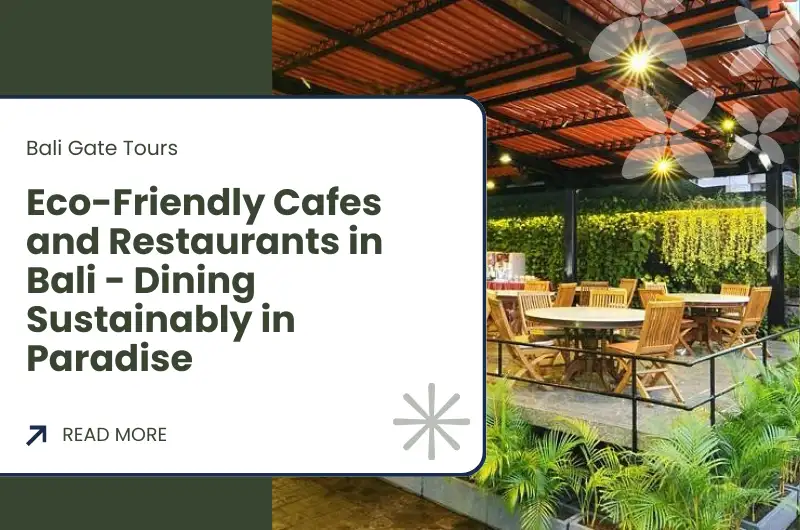Eco-Friendly Cafes and Restaurants in Bali - Dining Sustainably in Paradise

Bali has long been celebrated as a tropical paradise, attracting travelers with its stunning beaches, vibrant culture, and lush landscapes. But beyond its natural beauty and tourist attractions, the island has emerged as a hub for eco-friendly cafés Bali, where dining experiences are designed to harmonize with the environment. These establishments are committed to sustainable practices, from sourcing ingredients locally to reducing waste and using environmentally friendly materials, offering visitors a chance to indulge their taste buds responsibly.
One of the most compelling aspects of dining at sustainable dining Bali venues is the emphasis on local and organic ingredients. Many cafés and restaurants work directly with nearby farmers and cooperatives to source fresh produce, spices, and dairy, ensuring that every meal supports the local economy while minimizing the environmental footprint. Guests can savor dishes crafted from seasonal vegetables, handpicked fruits, and ethically raised proteins, all while enjoying the knowledge that their meal promotes a healthier planet.
In addition to sourcing practices, green restaurants Bali prioritize waste reduction and environmentally conscious operations. Composting food scraps, minimizing single-use plastics, and offering biodegradable packaging are standard practices in many of these establishments. Some cafés have even adopted zero-waste philosophies, transforming leftover ingredients into creative dishes or preserving them for future use, demonstrating that delicious meals and sustainability can coexist beautifully.
The design and ambiance of eco-friendly dining spots in Bali also reflect their commitment to the environment. Interiors often incorporate natural materials such as bamboo, reclaimed wood, and stone, creating warm, inviting spaces that connect diners with nature. Outdoor seating areas are commonly designed to blend seamlessly with gardens, rice fields, or ocean views, allowing guests to experience eco-friendly cafés Bali not just as a meal, but as a holistic sensory journey that celebrates the island’s natural beauty.
Beyond aesthetics, many sustainable dining venues integrate educational elements into the experience. Visitors can learn about local agriculture, permaculture practices, and environmentally friendly food preparation techniques. Cooking workshops, farm tours, and interactive sessions with chefs provide hands-on opportunities to understand how conscious choices in the kitchen can make a meaningful impact. By combining education with gastronomy, these sustainable dining Bali establishments create experiences that resonate deeply with socially and environmentally conscious travelers.
Beverages are another highlight of eco-conscious cafés. Many serve fresh, organic juices, locally sourced coffee, and herbal teas, with a strong focus on ethically traded products. Bali’s thriving coffee culture has inspired numerous green restaurants Bali to explore farm-to-cup sourcing, showcasing beans cultivated in harmony with the environment. Guests can savor their morning brew knowing that it supports local communities and promotes sustainable agricultural practices.
Community engagement is also a central pillar of Bali’s eco-friendly dining scene. Many restaurants partner with local artisans, cooperatives, and social enterprises to promote traditional crafts, fair wages, and environmental stewardship. By choosing to dine at these establishments, visitors actively support initiatives that enhance the island’s cultural and ecological resilience, making each meal an opportunity to contribute positively to the community while enjoying the rich flavors of Bali local food.
Innovative menus at eco-conscious cafés often feature plant-based and vegetarian options, reflecting a growing awareness of the environmental benefits of reduced meat consumption. Dishes are thoughtfully crafted to highlight fresh, seasonal ingredients while offering vibrant flavors and textures. Whether it’s a colorful Buddha bowl, a tropical smoothie, or a locally inspired dessert, guests experience the harmony of taste and sustainability, solidifying the appeal of organic dining Bali as a modern culinary trend with a purpose.
Even dessert and snacks at Bali’s sustainable cafés embrace eco-friendly principles. Many establishments create treats from surplus or local ingredients, use natural sweeteners, and avoid artificial additives, ensuring that indulgence doesn’t come at the expense of the planet. From handcrafted pastries to tropical fruit parfaits, the combination of creativity and responsibility makes dessert time a truly joyful and conscious experience in eco-friendly cafés Bali.
In addition to food and drink, these establishments often integrate practices that extend sustainability beyond the plate. Rainwater harvesting systems, solar energy panels, and energy-efficient kitchen appliances are common features, demonstrating a holistic approach to environmental responsibility. Visitors to sustainable dining Bali can witness firsthand how businesses can operate efficiently while minimizing their ecological footprint, serving as inspiration for both locals and travelers seeking to live more consciously.
Many eco-friendly cafés and restaurants in Bali also embrace a collaborative approach to sustainability. They share ideas, practices, and innovations across the community, creating networks of establishments that promote environmentally responsible dining island-wide. This collective commitment enhances the overall impact, allowing visitors to enjoy a wide variety of green restaurants Bali without compromising their values, and offering a model for sustainable tourism that combines pleasure with purpose.
Visiting Bali’s eco-conscious dining spots is not just about a meal; it is about embracing a lifestyle that values the planet, community, and personal well-being. From organic ingredients and mindful sourcing to engaging educational experiences and immersive design, these cafés and restaurants provide a uniquely enriching experience for travelers. Each visit offers the satisfaction of knowing that indulgence and sustainability can coexist, leaving diners with lasting memories and a renewed appreciation for conscious living in Bali local food culture.
In conclusion, Bali’s eco-friendly cafés and restaurants represent the island’s commitment to sustainability, innovation, and community engagement. Dining here is a celebration of taste, creativity, and responsibility, where guests can enjoy meals crafted from the freshest ingredients, immerse themselves in educational experiences, and support local initiatives. By choosing these establishments, travelers embrace a lifestyle of mindfulness, indulge in organic dining Bali, and experience the perfect harmony between flavor, culture, and environmental stewardship in paradise.










